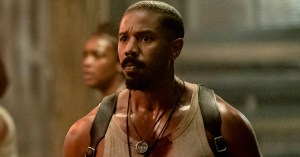CANNES: "The Da Vinci Code" Review
Dan Brown’s novel "The Da Vinci Code" has the rep as a page-turner with more intellectual heft than your average pulp. So it comes as something of a surprise that Ron Howard‘s film adaptation, premiering at Cannes, is so stagnant. It feels more like a walk through a museum than a thriller about conspiracy that could shake Christianity to its very core.
The story involves a famed symbologist Robert Langdon (Tom Hanks) who is drawn into a mystery after a man he knew professionally is murdered at the Louvre. A series of clues around the museum lead Langdon and a police cryptologist (Audrey Tautou) on a search that reveals mysterious Catholic orders that will go to any lengths to protect Church secrets.
The film isn’t lacking for interesting or appealing performers, but they’re given so little do; the film squanders the normally sympathetic Hanks and Tautou in scenes where they’re essentially shouting historical quasi-facts at each other while running from somebody. Their characters have almost no back stories, other than some childhood traumas revealed in flashbacks. Ian McKellen, Alfred Molina, and Jean Reno do what they can with their roles, but ultimately, after an overdose of information and five or six and things-aren’t-as-they-seem moments, it gets awfully hard to care about the characters or the plot.
The film isn’t to Christianity what "JFK" is to American politics; heck, it isn’t even as sharp as "Indiana Jones and the Last Crusade," a Holy Grail search that was more exciting, more amusing, and frankly, more theologically interesting. For all of the controversy surrounding "The Da Vinci Code," the biggest problem with the film isn’t that it’s sacrilegious (it isn’t, really), it’s that it feels so dramatically flat.
The film currently stands at 22 percent on the Tomatometer; see what other critics are saying here.









